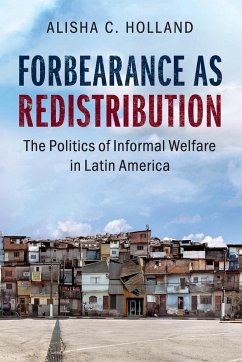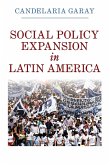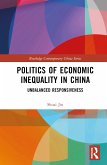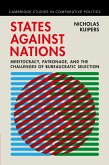Alisha C. Holland (New Jersey Princeton University)
Forbearance as Redistribution
Alisha C. Holland (New Jersey Princeton University)
Forbearance as Redistribution
- Broschiertes Buch
- Merkliste
- Auf die Merkliste
- Bewerten Bewerten
- Teilen
- Produkt teilen
- Produkterinnerung
- Produkterinnerung
The book explains why and when laws go unenforced in developing countries.
Andere Kunden interessierten sich auch für
![Soldiers, Politicians, and Civilians Soldiers, Politicians, and Civilians]() David Pion-BerlinSoldiers, Politicians, and Civilians41,99 €
David Pion-BerlinSoldiers, Politicians, and Civilians41,99 €![Social Policy Expansion in Latin America Social Policy Expansion in Latin America]() Candelaria Garay (Massachuset John F. Kennedy School of GovernmentSocial Policy Expansion in Latin America41,99 €
Candelaria Garay (Massachuset John F. Kennedy School of GovernmentSocial Policy Expansion in Latin America41,99 €![The Art of Political Control in China The Art of Political Control in China]() Daniel C. Mattingly (Connecticut Yale University)The Art of Political Control in China43,99 €
Daniel C. Mattingly (Connecticut Yale University)The Art of Political Control in China43,99 €![Revolution in Syria Revolution in Syria]() Kevin MazurRevolution in Syria44,99 €
Kevin MazurRevolution in Syria44,99 €![Rivalry and Revenge Rivalry and Revenge]() Laia Balcells (North Carolina Duke University)Rivalry and Revenge43,99 €
Laia Balcells (North Carolina Duke University)Rivalry and Revenge43,99 €![Politics of Economic Inequality in China Politics of Economic Inequality in China]() Shuai JinPolitics of Economic Inequality in China154,99 €
Shuai JinPolitics of Economic Inequality in China154,99 €![States against Nations States against Nations]() Nicholas Kuipers (New Jersey Princeton University)States against Nations38,99 €
Nicholas Kuipers (New Jersey Princeton University)States against Nations38,99 €-
-
-
Produktdetails
- Produktdetails
- Cambridge Studies in Comparative Politics
- Verlag: Cambridge University Press
- Seitenzahl: 400
- Erscheinungstermin: 19. März 2019
- Englisch
- Abmessung: 229mm x 152mm x 24mm
- Gewicht: 584g
- ISBN-13: 9781316626351
- ISBN-10: 1316626350
- Artikelnr.: 47721869
- Herstellerkennzeichnung
- Libri GmbH
- Europaallee 1
- 36244 Bad Hersfeld
- gpsr@libri.de
- Cambridge Studies in Comparative Politics
- Verlag: Cambridge University Press
- Seitenzahl: 400
- Erscheinungstermin: 19. März 2019
- Englisch
- Abmessung: 229mm x 152mm x 24mm
- Gewicht: 584g
- ISBN-13: 9781316626351
- ISBN-10: 1316626350
- Artikelnr.: 47721869
- Herstellerkennzeichnung
- Libri GmbH
- Europaallee 1
- 36244 Bad Hersfeld
- gpsr@libri.de
Alisha C. Holland is an Assistant Professor in the Department of Politics at Princeton University, New Jersey. She was a Junior Fellow at the Society of Fellows at Harvard University, Massachusetts. Holland's doctoral dissertation received the Best Dissertation Award from the Urban Politics Section of the American Political Science Association and the Robert Noxon Toppan Award for the best dissertation from the Department of Government at Harvard University. Her research on Latin American and urban politics has appeared in the American Journal of Political Science, American Political Science Review, Comparative Political Studies, and Latin American Research Review.
1. An electoral theory of forbearance
2. Who votes for forbearance
3. What enables forbearance: inadequate social policy and squatting
4. When politicians choose forbearance: core constituencies and street vending
5. Where forbearance occurs: the role of electoral institutions
6
Why forbearance continues: path dependencies in the informal welfare state
7. How forbearance ends: lessons from Turkey.
2. Who votes for forbearance
3. What enables forbearance: inadequate social policy and squatting
4. When politicians choose forbearance: core constituencies and street vending
5. Where forbearance occurs: the role of electoral institutions
6
Why forbearance continues: path dependencies in the informal welfare state
7. How forbearance ends: lessons from Turkey.
1. An electoral theory of forbearance
2. Who votes for forbearance
3. What enables forbearance: inadequate social policy and squatting
4. When politicians choose forbearance: core constituencies and street vending
5. Where forbearance occurs: the role of electoral institutions
6
Why forbearance continues: path dependencies in the informal welfare state
7. How forbearance ends: lessons from Turkey.
2. Who votes for forbearance
3. What enables forbearance: inadequate social policy and squatting
4. When politicians choose forbearance: core constituencies and street vending
5. Where forbearance occurs: the role of electoral institutions
6
Why forbearance continues: path dependencies in the informal welfare state
7. How forbearance ends: lessons from Turkey.









